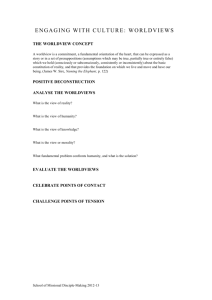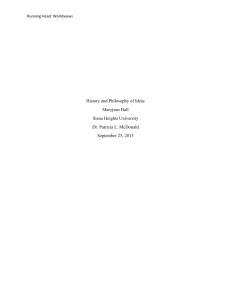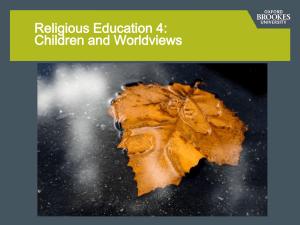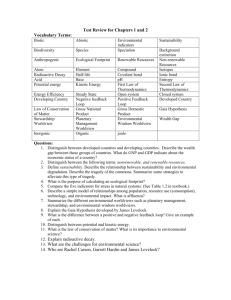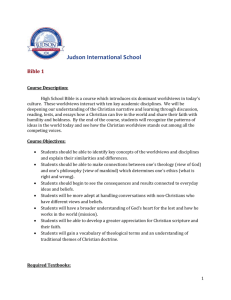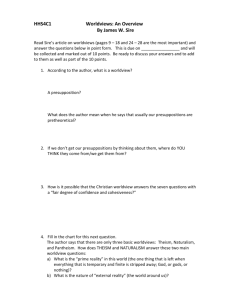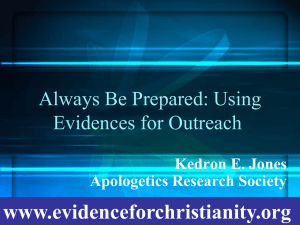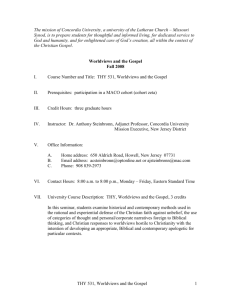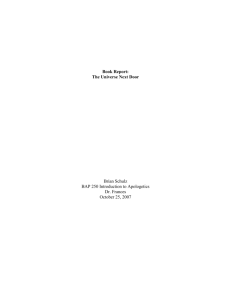Worldviews and IR theory
advertisement
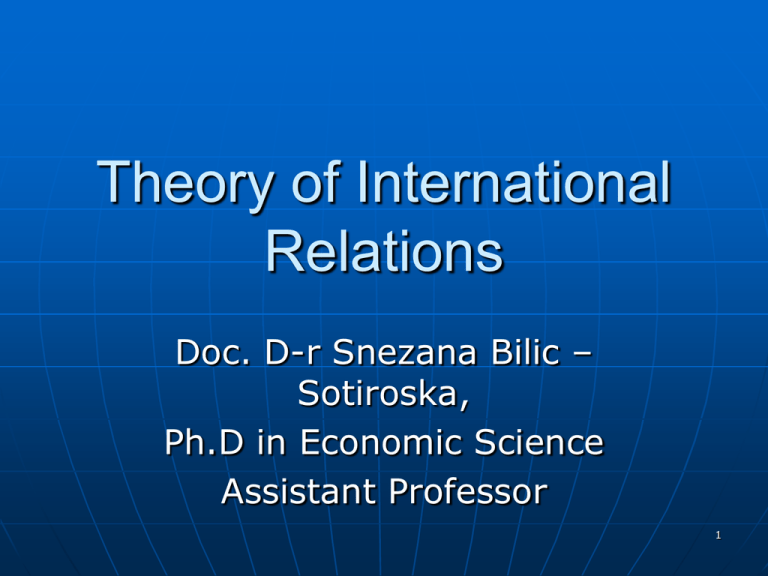
Theory of International Relations Doc. D-r Snezana Bilic – Sotiroska, Ph.D in Economic Science Assistant Professor 1 Fundamentals of Theory of IR 1 Worldviews and IR theory: Conquest or coexistence? Introduction to the diverse worldviews that support contemporary International Relations (IR) theory. 2 Worldviews and IR theory Worldviews and theories in IR A worldview is a broad interpretation of the world and an application of this view to the way in which we judge and evaluate activities and structures that shape the world. In simpler terms, our worldview is ‘a view of the world and a view for the world’ 3 Worldviews and IR theory Worldviews have two interdependent dimensions: The first dimension is ontological. Worldviews contain fundamental assumptions and presuppositions about the constitutive nature of IR. Such assumptions or beliefs are our most fundamental thoughts about the nature of ‘being, existence, or reality, as well as the basic categories of being and their relations. 4 Worldviews and IR theory The second dimension is evaluative Worldviews is evaluative, providing the basis for judging and prescribing institutional arrangements and principles of conduct with regard to or within the parameters of IR. 5 Worldviews and IR theory The importance of the distinction, and the relationship between ontology and evaulation, has been noted by the philosopher Taylor (1971) in the context of political theory. 6 Worldviews and IR theory ‘Worldviews’ are not ‘theories’, although these terms are often conflated in the field of IR. For example, an empirical theory is an explanation of an event, or more usually of a pattern of events. • Why did the United States invade Iraq in 2003? • Why do wars take place? • Why are some countries rich and others poor? 7 Worldviews and IR theory Realism, contains an identifiable set of core principles, but the realist worldview is itself an ideal-type, and it is important to recognize the limitations of trying to ‘fix’ the status of realism within a discipline whose very identity as a social science is constantly debated. 8 Worldviews and IR theory Conquest or coexistence? The first response is self-evident. One worldview is right and the others are wrong. Or we could express it in more suitable terms: each of the worldviews may generate interesting insights, but one of them is far superior to the others. 9 Worldviews and IR theory To engage with such questions is to enter the world of IR theory. First, the subject matter of IR is simply huge: war, demographic change, state-making, global warming, unequal development, nationalism, the ‘war on terror’, international organization, shifts in power between the United States and China – the central issue or problem 10 Worldviews and IR theory That should dominate the research agenda in this field. It is worth recalling that IR – as an autonomous field of study in political science 11 Worldviews and IR theory Today, a whole host of issues compete for our attention, and it could be argued that one reason for the increasing of worldviews is the increasing of issues that each worldview seeks to privilege. Thus for realists, war between states remains the central problem. 12 Worldviews and IR theory For liberal internationalists, the unequal distribution of political freedom for individuals is the problem. For Marxists, the central issue is the injustice of global capitalism and the stratification of class on a global scale. 13 Worldviews and IR theory For critical theorists, it is the needless suffering caused not just by capitalism but also by other dynamics of modernity at the global level. Constructivists focus less on substantive issues than the broader problem of how changes in states’ identities and interests can shift the culture of IR from one of conflict to one of cooperation. 14 Worldviews and IR theory Members of the ‘English School’ broadly united by a shared concern with the history, dynamics, and future of something called ‘international society’. Feminists are inspired by the ideal of gender equality, and outraged by the global consequences of what they regard as the gendered character of the modern sovereign state. 15 Worldviews and IR theory Poststructuralists are interested in the processes and practices that make it possible to even conceive of the domain of ‘international relations’ as a distinct field of political practice. Finally, postcolonial theorists are interested in the stories, identities, and forms of political emancipation available to the marginalized members of the global South. 16 Grand Theories of International Relations In its effort to find answers to extra-scientific political and societal crises and problems, the science of International Relations, over time, has produced a number of different Grand Theories of international politics, which try to understand its subject matter and phenomena on the basis of: different perspectives of perception/interpretation different sets of questions different anthropological different normative and ethical and different methodological predispositions and presuppositions Grand Theories of I.R. II Grand Theories differ in view of their ontological assumptions, i.e. those assumptions referring to the nature of their research objects. Grand Theories formulate different premisses and assumptions regarding the international milieu, i.e. the characteristic outlook, quality, and structure of the environment in which international actors act the quality, character, and substance of international actors themselves actors‘ aims and interests and the means which actors, as a rule, use in the fulfillment of their aims and interests. Grand Theories and World Views Each and every Grand Theory formulates a characteristic world view of International Relations: Grand Theories and their world views compete with each other without offering science a possibility to decide which of the Grand Theories is the (only) correct representation of international reality. If it would want to decide this question, science would need a Hypothetical point (Archemedian point) over and beyond the competition of the Grand Theories, which would enable it to establish firm criterias for deciding on the truth or falseness of those premisses on which Grand Theories base their ontological edifice. This Archemedian point is nowhere in sight !! Grand Theories of International Relations Grand Theory Actor Realism Milieu Structural Principle World of states as an-archic state of nature Vertical segmentation, unlimited zerosum game for power, influence, ressources World of states as legally constituted society Vertical Segmentation, zero-sum game regulated by norm and agreement World society as society of individuals and their associations Universalistic constitution Nation State English School or Rationalism Idealism Individual Grand Theories of International Relations II Grand Theory Actor Milieu Structural Principle Interdependencyoriented Globalism Individual or societal actors Transnational society Functional border-crossing networks Theories of Imperialism Individual or societal actors representing class interests International class society Border-crossing horizontal layering Dependency oriented Globalism: Dependency Theories and Theories of the Capitalist world system Societal and national actors representing class interests World system of Capitalism as layering of metropoles and peripheries Horizontal layering of national actors in the world system; structural dependence of peripheries on metropoles; structural heterogenity of peripheries Worldviews and IR theory CONCLUSIONS: Worldviews are necessary. They frame the domain of IR and provide the conceptual language and fundamental assumptions (both ontological and evaluative) on the basis of which specific phenomena and patterned relationships are explained via theory. 22 Worldviews and IR theory Contemporary IR theory exhibits a wide variety of competing worldviews. To be sure, they are not all mutually exclusive. Productive conversations can take, and have taken, place between realists and liberals over the dynamics of cooperation among states and the conditions for regime maintenance in a variety of issue areas. 23 Worldviews and IR theory Critical theory emerged from Marxism. Whilst it is presented here as a distinctive worldview, feminism is a multidimensional worldview in which liberals, radicals, and poststructuralists engage in dialogue with one another. Similarly, there is much overlap between Marxism, critical theory, and postcolonialism. 24 Worldviews and IR theory ‘The English School’ is distinctive in that its members explicitly recognize a legitimate plurality of ‘traditions of international thought’. It is not difficult to find further areas of actual and potential overlap. 25 Worldviews and IR theory A worldview on worldviews, or perspective on perspectives, is necessary in order to assess the merits of alternative worldviews. An appropriate starting point, is to recognize IR as an extreme manifestation of human tragedy. 26 Worldviews and IR theory The question then becomes, to what extent does each worldview provide us with important insights into the dynamics of tragedy and empower us, if not to overcome it, at least to ameliorate its effects? This subject is an introduction to the diverse ways in which IR theory can assist ‘us’ in answering this central question. 27 The first Great Debate between Idealism and Realism Thank you for the attention e-mail: sbilicsotiroska@yahoo.com 29
